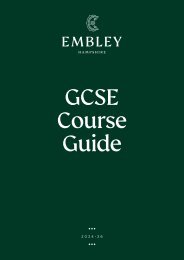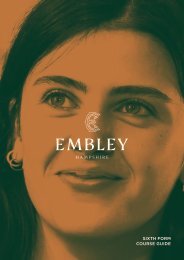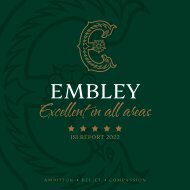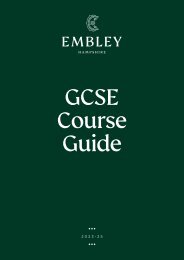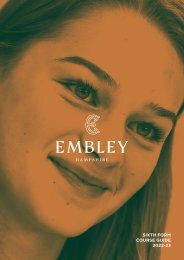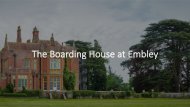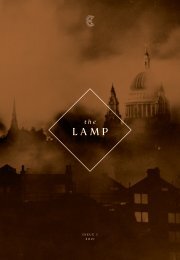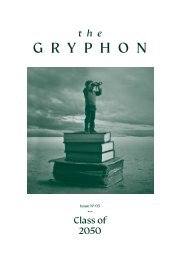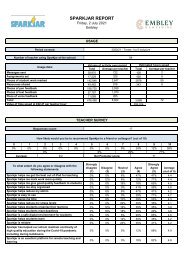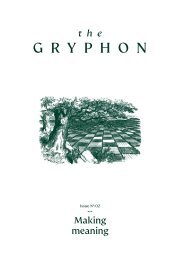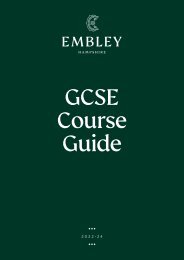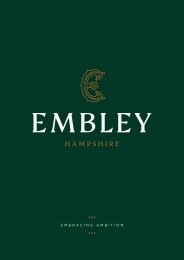Create successful ePaper yourself
Turn your PDF publications into a flip-book with our unique Google optimized e-Paper software.
t h e<br />
G R Y P H O N<br />
<strong>Issue</strong> N o 04<br />
What makes<br />
us human?
“What a piece of work is a man!<br />
How noble in reason!<br />
How infinite in faculty!<br />
In form and moving<br />
how express and admirable!<br />
In action how like an angel!<br />
In apprehension how like a god!”<br />
HAMLET (2.2.295-302)<br />
12
Welcome<br />
<strong>Issue</strong> N o 04<br />
2022/23<br />
Welcome to <strong>the</strong> latest edition<br />
of our chapbook, <strong>the</strong> <strong>Gryphon</strong>,<br />
in which our pupils, past and<br />
present, and staff consider <strong>the</strong><br />
essence of human existence.<br />
2<br />
COMEDY. COURAGE. COMPASSION.<br />
Our ability to make people smile, realise<br />
opportunities and our potential and <strong>the</strong> power<br />
to care and forgive.<br />
4<br />
PENNY FOR YOUR THOUGHTS<br />
Our Sixth Form students share <strong>the</strong>ir ideas about<br />
what <strong>the</strong> essence of humanity means to <strong>the</strong>m.<br />
At Embley every child is unique<br />
and deserves <strong>the</strong> recognition<br />
of that as <strong>the</strong>y grow. We help<br />
<strong>the</strong>m achieve <strong>the</strong>ir ambitions,<br />
encourage belief in oneself while<br />
being mindful that <strong>the</strong> greatest<br />
happiness is achieved by being<br />
compassionate to o<strong>the</strong>rs.<br />
Embley Park, Romsey,<br />
Hampshire SO51 6ZE<br />
Main switchboard:<br />
+44 (0) 1794 512206<br />
Email: info@embley.org.uk<br />
www.embley.org.uk<br />
6<br />
JOURNEY OF LIFE<br />
Our life is a journey of highs and lows, successes<br />
and failures which define us as individuals.<br />
8<br />
THINKING BIG<br />
A former Embley Head Girl describes how school<br />
has shaped her into <strong>the</strong> person she is today.<br />
10<br />
OUR ABILITY TO MAKE CHOICES<br />
Humans are <strong>the</strong> only beings capable of<br />
changing <strong>the</strong> world to be a better place for all,<br />
writes one student.<br />
12<br />
Carbon balanced print is produced by a carbon<br />
balanced printer on carbon balanced paper.<br />
This edition of <strong>the</strong> <strong>Gryphon</strong>:<br />
73kg of carbon balanced & 51m 2 of land protected.<br />
NO MAN IS AN ISLAND<br />
Connection is central to our survival,<br />
our sense of well-being, our sense of self.<br />
1
Comedy.<br />
Courage.<br />
Compassion.<br />
The question we pose in this issue of <strong>the</strong> <strong>Gryphon</strong><br />
is ground well-trodden, writes Headmaster, Cliff<br />
Canning. It invites us to consider what is unique to a<br />
species that shares large portions of DNA with o<strong>the</strong>r<br />
sentient life and o<strong>the</strong>r carbon-based compounds.<br />
2
t h e<br />
G R Y P H O N<br />
will begin by looking at <strong>the</strong> question<br />
I from <strong>the</strong> point of view of understanding<br />
our capacities. What makes us human is<br />
our capacity for humour, something <strong>the</strong><br />
ancients understood very well. Aristotle<br />
wrote one book of Poetics on tragedy and<br />
<strong>the</strong> dramatic arts but two on Comedy, both<br />
sadly lost. Umberto Eco’s The Name of <strong>the</strong><br />
Rose describes an imaginative, if disturbing,<br />
search for an attempt to hide this work.<br />
Comedy fascinates me; <strong>the</strong>re is an essential<br />
conviviality with comedy. The ability to<br />
sing and perform touches audiences, but<br />
<strong>the</strong> ability to make diverse people laugh<br />
and <strong>the</strong> infectious nature of laughter<br />
brings people toge<strong>the</strong>r. Humans are social<br />
creatures, and <strong>the</strong> glue that binds this is<br />
laughter. It is unlikely that folk will ga<strong>the</strong>r<br />
for an evening to have a good cry, but much<br />
more likely <strong>the</strong>y do so to entertain and be<br />
entertained, to laugh toge<strong>the</strong>r.<br />
If <strong>the</strong> capacity for comedy makes us human<br />
and in so doing brings us toge<strong>the</strong>r, <strong>the</strong>re is a<br />
capacity that makes us human which stands<br />
us apart. The capacity for courage. Life has<br />
recently thrown a number of difficulties<br />
our way, but that is what life does. I am<br />
concerned very often at what I see as <strong>the</strong><br />
over amplification of anxiety free living.<br />
Why? Because it doesn’t exist. Anxiety and<br />
worry are part of our experience, to avoid<br />
<strong>the</strong>m is to intoxicate ourselves with a<br />
rejection of what is essential to humanity.<br />
Instead, <strong>the</strong> courage ‘to be’ makes us<br />
human. It is Hamlet’s cry from <strong>the</strong> heart, in<br />
taking up arms against a sea of troubles, we<br />
end <strong>the</strong>m. Not necessarily because <strong>the</strong>y are<br />
imagined; nor that we resolve <strong>the</strong>m; but that<br />
in embracing <strong>the</strong>m we engage ourselves in<br />
<strong>the</strong> process of becoming, of realising our<br />
potential. There are no problems, just<br />
opportunities for solutions.<br />
Too glib? Certainly. And trite, but not<br />
necessarily untrue. There are many<br />
moments where I stand back in bewildered<br />
awe at children who talk with me and<br />
au<strong>the</strong>ntically face <strong>the</strong>ir fears, who open up<br />
about what is going on and resolve to do<br />
something about it, who carry on sailing<br />
through <strong>the</strong>ir school day while frantically<br />
working to keep <strong>the</strong> ship afloat; it is a mark<br />
of <strong>the</strong>ir individuality, <strong>the</strong>ir ‘becoming’ -<br />
<strong>the</strong>ir humanity. The courage to say no, I’m<br />
not doing that, or yes, it was me. Apologising<br />
and taking <strong>the</strong> consequence without excuse<br />
or evasion; that courage stands us apart as<br />
individuals and makes us human.<br />
Of course, <strong>the</strong> corollary of stepping up and<br />
having <strong>the</strong> courage to take responsibility<br />
without hiding behind o<strong>the</strong>rs calls for<br />
<strong>the</strong> last of my three capacities making<br />
us human: compassion. The capacity we<br />
have and have seen to forgive those who<br />
wrong us may be <strong>the</strong> most profound of <strong>the</strong><br />
capacities that make us human. We have<br />
seen an outpouring of compassion realised<br />
in tangible form as we rallied round<br />
international need. This was immediate<br />
and overwhelming, quite literally so as we<br />
were inundated with clothing and supplies<br />
for refugees. But it is <strong>the</strong> quieter and more<br />
personal opportunity for compassion<br />
that most reveals our nature. There are<br />
daily instances of compassion across <strong>the</strong><br />
Prep playground and <strong>the</strong> playing fields of<br />
<strong>the</strong> Senior School. Moments of heartfelt<br />
compassion expressed in Wordsworthian<br />
little nameless acts of kindness and of love.<br />
Doubtless this <strong>Gryphon</strong> will provoke your<br />
own thoughts and reflections, but whe<strong>the</strong>r<br />
it is comedy, courage or compassion…<br />
what a piece of work is humanity.<br />
E: headmaster@embley.org.uk<br />
3
Penny for your<br />
thoughts<br />
“The essence of being human is that one does<br />
not seek perfection,” said <strong>the</strong> novelist and<br />
journalist George Orwell.<br />
4
t h e<br />
G R Y P H O N<br />
But is that all that makes us human? What<br />
about Science, religion or feelings? Can<br />
we narrow down <strong>the</strong> essence of humanity<br />
at all, or is being human merely an idea? We<br />
asked some of our Sixth Form students <strong>the</strong>ir<br />
thoughts on <strong>the</strong> topic.<br />
Liza: What makes us human is <strong>the</strong> things we<br />
feel: pain, disappointment, happiness, love.<br />
You can’t think through it with logic, but<br />
we feel it. For example, an animal can feel,<br />
but <strong>the</strong>ir emotions are based on instinct.<br />
They may kill because <strong>the</strong>y want food or<br />
feel threatened; <strong>the</strong>ir emotional range and<br />
reasoning is far less broad than that of a<br />
human. They love you because you are nice to<br />
<strong>the</strong>m – but only a human can love not because<br />
of something, but against it.<br />
Phoebe: Sometimes people approach things<br />
too scientifically and think what we are made<br />
of biologically is <strong>the</strong> sum of our parts. I don’t<br />
think it’s as simple as saying ‘we are humans’.<br />
It’s a social construct. People think that<br />
because we are human it gives us superiority.<br />
Tom: What makes us human is how we act.<br />
We all behave differently, and we are unique.<br />
Each person is raised in a family that moulds<br />
<strong>the</strong>m into who <strong>the</strong>y are, no two people are <strong>the</strong><br />
same.<br />
Nathan: I think bad emotions make us<br />
human, like greed. We’ve all made bad<br />
decisions. For example, I’m not aware of any<br />
animal that takes <strong>the</strong>ir own life because<br />
<strong>the</strong>y’ve done something bad. Humans have<br />
<strong>the</strong> capacity for evil, and <strong>the</strong> capacity to know<br />
that what <strong>the</strong>y are doing is evil.<br />
Faith: I’m going to go down a religious route<br />
which I know some people don’t agree with. In<br />
Noah’s Ark, God sent <strong>the</strong> floods to restart <strong>the</strong><br />
world, because humanity had reached a low<br />
point giving in to greed and sin and <strong>the</strong> world<br />
had become total chaos. He decided to start<br />
over and take <strong>the</strong> good man and his family<br />
and <strong>the</strong> innocent animals. All <strong>the</strong> bad things<br />
are what God is saying humans shouldn’t be.<br />
Nathan: But in <strong>the</strong> Bible it says ‘God created<br />
humans but gave <strong>the</strong>m free will.’ He let Adam<br />
eat <strong>the</strong> apple along with Eve, so with <strong>the</strong>m<br />
being greedy it makes <strong>the</strong>m human. And<br />
when God saw Adam and Eve naked, <strong>the</strong>y felt<br />
embarrassed - those are human emotions. So<br />
free will and <strong>the</strong> mistakes that come along<br />
with it - our imperfections - make us human.<br />
Phoebe: I think it is difficult, as humans, to<br />
describe what humanity really means. We<br />
don’t have access to any o<strong>the</strong>r opinions apart<br />
from humans because we can’t ask animals<br />
what <strong>the</strong>y think of us. As humans we are<br />
driven by external situations - humanity is<br />
an experience.<br />
Liza: Humans are <strong>the</strong> only creature that<br />
can lie. We only see <strong>the</strong> side of people that<br />
<strong>the</strong>y show us - we’re unique because we can<br />
control ourselves and make choices, and we<br />
can listen to our hearts.<br />
Faith: We have <strong>the</strong> cognitive ability to<br />
question why we are here. We all have a<br />
belief - for me it is God, for o<strong>the</strong>rs it may be<br />
Science - but our beliefs make us human.<br />
Animals don’t question <strong>the</strong>ir existence, <strong>the</strong>y<br />
just exist.<br />
Phoebe: I find it interesting that when<br />
people make a mistake <strong>the</strong>y say ‘But I’m<br />
only human’ which implies that we are<br />
weak. Maybe imperfection is what makes us<br />
human, having <strong>the</strong> capacity to be evil - even<br />
if you are not - differentiates us as humans.<br />
The conversation ended in agreement that<br />
humans are neutral but have capacity to<br />
decide to do extreme good or extreme bad,<br />
unlike <strong>the</strong>ir animal counterparts. As for<br />
<strong>the</strong> question ‘What makes us human?’ <strong>the</strong><br />
conversation never reached a conclusion,<br />
so perhaps it is uncertainty, free-will and<br />
<strong>the</strong> ability to ask questions that makes us<br />
human after all.<br />
E:????????????????????<br />
5
Journey<br />
of life<br />
6
t h e<br />
G R Y P H O N<br />
What makes us human?<br />
It’s a question that has been asked by all cultures<br />
for millennia, and an enormously complex one<br />
that is in many ways almost impossible to answer,<br />
writes Prep teacher Mike Gibb.<br />
Psychology would argue what makes us<br />
human is our individuality. We are all<br />
shaped by our experiences and influenced<br />
by our surroundings, with each circumstance<br />
creating a new perceptive. Biology would<br />
suggest it is <strong>the</strong> unique features of <strong>the</strong> human<br />
body which mark us apart from o<strong>the</strong>r living<br />
beings. The larynx, shoulders, our hands<br />
with opposable thumbs, naked, hairless skin,<br />
standing upright and bipedalism, our blushing<br />
response and, most significantly, <strong>the</strong> human<br />
brain and our minds with <strong>the</strong>ir imagination,<br />
creativity and forethought. Sociologists see<br />
our social interactions and ability to develop<br />
civilisations as something distinctly human.<br />
The knowledge of our own mortality has also<br />
spurred humans on to great achievements, to<br />
making <strong>the</strong> most out of <strong>the</strong> lives <strong>the</strong>y have. We<br />
are unique amongst animals in understanding<br />
our lifecycle and ultimate mortality. Some<br />
social psychologists maintain that without <strong>the</strong><br />
knowledge of death, <strong>the</strong> birth of civilisation<br />
and <strong>the</strong> accomplishments it has spawned might<br />
never have occurred.<br />
I believe that it is living our daily lives that<br />
makes us human. Being able to process our<br />
experiences, learning constantly and developing<br />
our personalities and future behaviours. The<br />
privilege of working in a school is getting to see<br />
young lives grow and develop as well as having<br />
<strong>the</strong> opportunity to shape <strong>the</strong> experiences that<br />
will have a profound effect on <strong>the</strong>ir lives. Embley<br />
offers a hugely diverse range of activities, each<br />
of which has <strong>the</strong> prospect of having a profound<br />
effect on young people. It is taking <strong>the</strong>se<br />
opportunities and absorbing <strong>the</strong>se experiences<br />
which makes us human. Animals can learn from<br />
<strong>the</strong>ir experiences, but only humans can take<br />
those encounters and use <strong>the</strong>m to develop <strong>the</strong>ir<br />
intelligence, character and personality. Our<br />
humanity is defined by <strong>the</strong>se experiences.<br />
As complex, interesting, ingenious, curious,<br />
compassionate, creative and, at times,<br />
baffling human beings are, <strong>the</strong>re is a beautiful<br />
simplicity to our lives. We are all on a journey<br />
which will have highs and lows, successes and<br />
failures, but ultimately it is that journey which<br />
defines us as individuals, as human beings.<br />
What makes us human? It is living a life rich<br />
with experiences, emotions, hopes and dreams.<br />
To feel fully human, we must make <strong>the</strong> most<br />
of all life has to offer. It is apt to finish with an<br />
often-quoted truism which is a good guide for<br />
us all: carpe diem – seize <strong>the</strong> day!<br />
E: mike.gibb@embley.org.uk<br />
7
Thinking<br />
BIG<br />
I left Embley Sixth Form two years ago after<br />
five years at <strong>the</strong> school, writes former Head Girl<br />
Megan, and while I think it is a cliché to<br />
say that <strong>the</strong> school shaped me as a person,<br />
I will tell you what I am up to now.<br />
8
t h e<br />
G R Y P H O N<br />
am currently studying History & Politics<br />
I at <strong>the</strong> University of Southampton.<br />
Although I did not study Politics at<br />
Embley, I was fortunate enough to host an<br />
afternoon with Caroline Nokes, Minister for<br />
Immigration at <strong>the</strong> time and MP for Romsey<br />
and Southampton North. Hearing her speak<br />
about <strong>the</strong> challenges of being a female MP,<br />
but also of <strong>the</strong> incredible work she was doing<br />
and how she was able to shape lives, sparked<br />
my interest in Politics and<br />
resulted in me studying it at<br />
degree level.<br />
Shortly after leaving school,<br />
I started volunteering with<br />
Portsmouth City Council,<br />
working one-to-one with<br />
young people in <strong>the</strong> foster<br />
system. I have mentored<br />
a 13-year-old boy and<br />
currently a 10-year-old girl.<br />
Volunteering has led to<br />
me to start a new job that I<br />
am very passionate about.<br />
I am a support worker in<br />
residential homes for people<br />
in care. I work with young<br />
people aged four to 25 as<br />
well as families who need<br />
extra support in residential<br />
settings, making a difference by teaching<br />
<strong>the</strong>m life skills and helping <strong>the</strong>m make <strong>the</strong><br />
next steps into life after care.<br />
If you were to ask me five years ago what I<br />
wanted to do, I doubt I would have said this,<br />
but my school taught me how valuable it is<br />
to have someone in your corner. I may not<br />
have been <strong>the</strong> easiest student, a perfectionist<br />
with no confidence, but <strong>the</strong> staff were always<br />
I may not have been<br />
<strong>the</strong> easiest student,<br />
a perfectionist with<br />
no confidence, but<br />
<strong>the</strong> staff were always<br />
<strong>the</strong>re knowing when<br />
to support and when<br />
to push me, and now<br />
I get to do <strong>the</strong> same<br />
for some of <strong>the</strong> most<br />
vulnerable young<br />
people.<br />
<strong>the</strong>re knowing when to support and when to<br />
push me, and now I get to do <strong>the</strong> same for<br />
some of <strong>the</strong> most vulnerable young people.<br />
My school gave me confidence in myself<br />
and my abilities. In January of Year 12, I<br />
petitioned <strong>the</strong> Headmaster that I wanted<br />
to start a feminist club. By <strong>the</strong> October, I<br />
was hosting a Diversity & Inclusion Student<br />
Conference with seven speakers, including<br />
a representative from UN Women and<br />
a double amputee veteran<br />
from Making Generation R.<br />
Students attended workshops<br />
on disability, race, religion,<br />
<strong>the</strong> refugee crisis and gender<br />
equality and <strong>the</strong>y played<br />
games in wheelchairs to<br />
discover how difficult it is<br />
to do things <strong>the</strong>y take for<br />
granted. Now while I may<br />
have bitten off more than I<br />
could chew, it did teach me<br />
that I am capable of far more<br />
than I can imagine.<br />
I was lucky enough (if you<br />
could say that) to spend a lot<br />
of time with my Headmaster<br />
in my role as Head Girl,<br />
and despite me calling him<br />
silly for his huge, arguably<br />
unrealistic visions, I have followed in<br />
his footsteps of thinking big. During<br />
<strong>the</strong> pandemic I travelled to Costa Rica to<br />
volunteer with marine conservation, and<br />
this Summer I will be going to Central<br />
America for two months to volunteer and<br />
travel solo.<br />
This is how Embley shaped me, how did<br />
school shape you?<br />
9
OUR<br />
ABILITY<br />
TO MAKE<br />
CHOICES<br />
Considering <strong>the</strong> achievements of mankind<br />
from <strong>the</strong> beginning of time, I cannot help<br />
thinking that <strong>the</strong> answer to <strong>the</strong> question<br />
‘What makes us human?’ still eludes us,<br />
writes Senior School student Suvariya.<br />
There is no simple answer to what makes<br />
us <strong>the</strong> people we are today, without<br />
raising more questions. Is it our culture? Our<br />
environment? Our motivations? Our very<br />
nature?<br />
As a species, we are continually exploring <strong>the</strong><br />
complexities of our own neurology and <strong>the</strong><br />
mechanics of our human bodies. We learn<br />
more every day about <strong>the</strong> amazing ways in<br />
which we exist, under both favourable and<br />
adverse conditions. Human life, both as a<br />
biological and a social phenomenon, is a<br />
tricky subject, as our individuality is one of<br />
<strong>the</strong> biggest parts of who we are.<br />
Perhaps we should first define human nature.<br />
The obvious starting point is to look at our<br />
ancestry; where did we come from? What is<br />
<strong>the</strong> evolutionary <strong>the</strong>ory of humankind?<br />
Evolutionary biology and scientific evidence<br />
tells us that humans evolved from ape-like<br />
ancestors, called hominids, more than six<br />
million years ago in Africa. What separates<br />
us from animals, though, is <strong>the</strong> size of<br />
our brains. Our minds allow us to weigh<br />
decisions and potential outcomes against<br />
each o<strong>the</strong>r and decide for ourselves <strong>the</strong> most<br />
desirable option.<br />
Thomas Suddendorf, Professor of Psychology<br />
at <strong>the</strong> University of Queensland, suggests<br />
that our ability to foresee potential outcomes<br />
is key: ‘one of <strong>the</strong> key characteristics that<br />
makes us human appears to be that we can<br />
think about alternative futures and make<br />
deliberate choices accordingly.’ As humans,<br />
we have been making decisions since <strong>the</strong><br />
beginning; perhaps this is what separates us<br />
from o<strong>the</strong>r creatures in <strong>the</strong> world.<br />
10
t h e<br />
G R Y P H O N<br />
Although this is true, we are not simply<br />
rational calculating machines, we are so<br />
much more. We are at <strong>the</strong> top of <strong>the</strong> food<br />
chain: intelligent, capable of speech, creative<br />
thought and complex communication.<br />
Perhaps <strong>the</strong>re are a number of things which<br />
make us human.<br />
Facing <strong>the</strong> possibility of challenge within<br />
our lifetime, we may speculate about what<br />
might be our next evolutionary step. Some<br />
people say that Artificial Intelligence is<br />
going to change <strong>the</strong> world more quickly<br />
than we realise; o<strong>the</strong>rs suggest that we will<br />
integrate digital technology into ourselves,<br />
ra<strong>the</strong>r than holding it in our hands.<br />
At a time when supercomputers like IBM’s<br />
Watson are being developed and we risk<br />
robots taking over our jobs, it might be<br />
relevant to define what makes us human<br />
now more than ever, before we become<br />
subsumed into <strong>the</strong> digital world.<br />
It is perhaps time to look again at how we<br />
have evolved. My initial reference to ape-like<br />
creatures, suggests how far we have come,<br />
to become thinkers, capable of abstract<br />
reasoning. This ability to apply logical<br />
principles is probably <strong>the</strong> most important<br />
thing which distinguishes us from animals,<br />
whose acts are based solely on instincts and<br />
impulses.<br />
For me, being human means that I have a<br />
choice, about what I want to do, how I want<br />
to live and <strong>the</strong> many things that I will need<br />
to do in order to survive and thrive. The<br />
characteristics that make humans different<br />
from every o<strong>the</strong>r living thing on Earth, is our<br />
strong will to live, choose and continuously<br />
adapt, change, hope and love. In short,<br />
humans are <strong>the</strong> only beings capable of<br />
changing <strong>the</strong> world to be a better and more<br />
positive place for all.<br />
11
NO MAN IS<br />
AN ISLAND<br />
“No man is an island entire of itself;<br />
every man is a piece of <strong>the</strong> continent,<br />
a part of <strong>the</strong> main… any man’s death<br />
diminishes me, because I am involved in<br />
mankind. And <strong>the</strong>refore never send to know<br />
for whom <strong>the</strong> bell tolls; it tolls for <strong>the</strong>e.”<br />
JOHN DONNE 1624<br />
12
t h e<br />
G R Y P H O N<br />
As a <strong>the</strong>rapist, writes Kate Rodgers,<br />
Embley’s school counsellor, <strong>the</strong><br />
importance of connection with <strong>the</strong> ‘o<strong>the</strong>r’,<br />
<strong>the</strong> quality and depth of our <strong>the</strong>rapeutic<br />
relationship, is fundamental. Positive<br />
connections with o<strong>the</strong>rs mean that we feel<br />
seen, understood, and valued. We matter, we<br />
belong, we exist.<br />
Connection to o<strong>the</strong>rs is crucial. Infants<br />
flourish under our attention - <strong>the</strong>y look<br />
for eye contact, smiles, holding, and talking<br />
from us, and <strong>the</strong>y respond accordingly.<br />
Ancient people didn’t survive as lone beings<br />
and <strong>the</strong>re is recent evidence of intimate<br />
interactions between human subspecies<br />
scientists never thought possible.*<br />
Paradoxically, we recently endured<br />
extraordinary disconnection from loved<br />
ones, friends and school to ensure survival.<br />
The pandemic has resulted in increasing<br />
rates of anxiety, eating disorders, body<br />
dysmorphia, and loneliness - especially<br />
within young people across <strong>the</strong> country.<br />
How much of this could be a response to<br />
prolonged, profound disconnection on<br />
several different levels?<br />
Alongside <strong>the</strong> pandemic, <strong>the</strong>re appears to be<br />
a growing sense of disconnection in several<br />
areas:<br />
Mind and body - With <strong>the</strong> rise in<br />
dissatisfaction with body image, we view our<br />
physical body as a separate entity - an object<br />
that needs altering to fit ‘social norms’.<br />
To nature - There is such disconnection that<br />
we are destroying our planet. Psychologists<br />
use <strong>the</strong> term ‘nature deficit disorder’ to<br />
explain challenging behaviours in young<br />
people living in inner cities.<br />
Electronics - We see people being ‘toge<strong>the</strong>r’<br />
but connected to screens, not physically with<br />
each o<strong>the</strong>r. How does this affect our sense of<br />
connection or disconnection to o<strong>the</strong>rs, <strong>the</strong><br />
world, ourselves, our bodies?<br />
During <strong>the</strong> pandemic we adapted, virtual<br />
connection was vital. I continued to support<br />
<strong>the</strong> children online but our discussions<br />
often lacked <strong>the</strong> deep sense of connection<br />
and inimitable experience of physically<br />
being present with ano<strong>the</strong>r human being.<br />
However, we’ve been reminded of o<strong>the</strong>r<br />
connections. All humanity was attacked by<br />
an uncontrollable virus. Connected through<br />
our vulnerability and mortality, it was, and<br />
is, a globally traumatic event. It doesn’t<br />
matter who, or where you are - this will have<br />
touched your life – and we can all empathise.<br />
All humans experience emotion. Our<br />
experiences are unique, but <strong>the</strong>re remains<br />
agreement of ‘base’ emotions: fear, love, joy,<br />
anger, disgust. When we recognise <strong>the</strong>m in<br />
o<strong>the</strong>rs we deeply connect through empathy,<br />
understanding and kindness. These very<br />
human experiences unite us. Knowing we<br />
are not alone is reassuring. Humans rally<br />
toge<strong>the</strong>r when things get challenging. We<br />
are reminded of <strong>the</strong> value connection brings.<br />
We adapted, and now have an opportunity<br />
to re-evaluate and form more meaningful<br />
connections. Connection is central to our<br />
survival, our sense of well-being, our sense<br />
of self. Make time to re-connect to yourself,<br />
your body, loved ones, community, <strong>the</strong> earth<br />
- you will feel <strong>the</strong> benefits. No man is an<br />
island.<br />
*For more on this, I can highly recommend<br />
reading The World Before Us by Tom Higham.<br />
E:kate.rodgers@embley.org.uk<br />
13
Embley Park, Romsey, Hampshire SO51 6ZE<br />
Main switchboard: +44 (0) 1794 512206<br />
Email: info@embley.org.uk<br />
www.embley.org.uk




